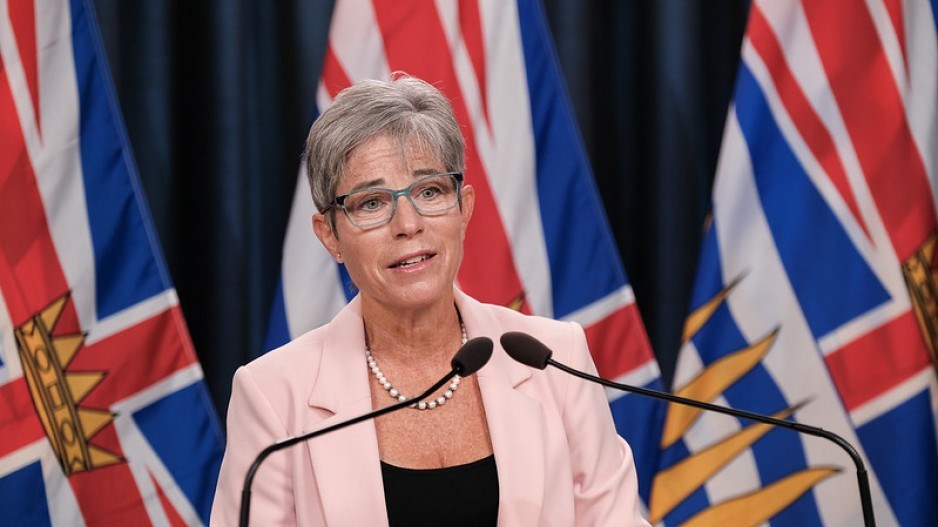Selina Robinson is suddenly the most popular kid on the post-secondary school block, as she grapples with what to do with a pile of highly coveted international student spaces.
Leaders of B.C.’s colleges and universities are carefully weighing their public reaction to the federal decision to cap international study permits, so as to not end up on the wrong side of the post-secondary minister or the BC NDP government.
Under the new federal cap, Robinson will have discretion over which institutions get the limited seats. Her choices could make or break the finances of dozens of post-secondary institutions.
Some institutional leaders, such as Royal Roads president Phillip Steenkamp, have warned of the uncertainty caused by the cap, and the message it sends internationally to those who might want to come to this country.
Royal Roads can perhaps afford to speak up, as almost three-quarters of its international students are graduate students, exempt from the new cap.
The University of Victoria and University of B.C. were much less vocal. They hunger to gobble up as many international students as they can squeeze out of Robinson.
It boils down to dollars and cents: UBC, for example, can charge up to $61,000 for an international student, compared to $6,000-9,000 for a domestic student. It brings in $657 million annually through international students — 62 per cent of its total tuition revenue stream. The university wants every single international student Robinson has available, and then some.
Part of the problem, though, is B.C. says it still doesn’t know exactly how many international students it will get under this new cap.
The worst-case scenario is the pure population-based figure of around 50,400 — a huge drop from the 175,000 last year.
Even with that reduced amount, those international students represent hundreds of millions of dollars in post-secondary fees. So you can see why everyone has eyes on the minister, to see what she’ll do next.
Answers may be coming as early as next week, as Robinson said she intends to unveil her plan to crack down on what she’s called “bad actors” in the system — basically, private colleges that are diploma mills.
Her ministry cited some examples, including schools that promise in-person programs that are actually online, use unqualified instructors, pressure students not to file complaints against the school, mislead students about eligibility for post-graduation work permits, mislead students about tuition costs and switch students from one program to another at the last minute.
Federal Immigration Minister Marc Miller has said he looks forward to B.C.’s plan. But Miller has also taken a couple of swipes at the province, along with Ontario, for allowing the situation to deteriorate so badly.
“We also have an ecosystem that’s been created that’s been very, very lucrative, where people pay four or five times what a domestic student would pay, and no one is immune from that, from the largest institutions to the smallest,” Miller told the CBC.
“This has become big business.”
The result, he said, has been lax standards.
“If you look at places in Surrey, Brampton or Mississauga as well as elsewhere, you see degree-granting institutions basically giving fake business degrees and basically people are working during the week, doing some work on the weekend, and then getting perhaps a three-year ability to work in Canada and hope to stay here,” said Miller.
“That isn’t the international student program.”
The BC NDP government rejected any suggestion it has underfunded post-secondary institutions. Miller, though, isn’t letting provinces off the hook.
“I’m not the minister of post-secondary education underfunding, I’m the minister of immigration,” Miller said this week. “Clearly in the last decade or so, post-secondary institutions in Canada have been underfunded.”
After a week of media interviews, Miller’s work on the international student cap will largely be done. He’ll walk away, leaving the political hot potato in the hands of the provinces.
Robinson will not only have to clean up the shady operators in the sector, she’ll have to craft a new system to recognize legitimate schools, come up with a way to award the remaining international spaces and deal with the economic consequences for those who’ve propped up their balance sheets on the backs of unsustainable numbers.
No small feat. And no small amount of pressure on the minister.
Rob Shaw has spent more than 15 years covering B.C. politics, now reporting for CHEK News and writing for Glacier Media. He is the co-author of the national bestselling book A Matter of Confidence, host of the weekly podcast Political Capital, and a regular guest on CBC Radio.




